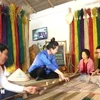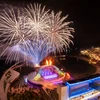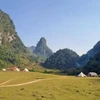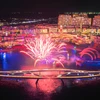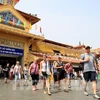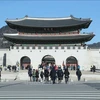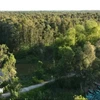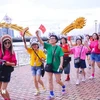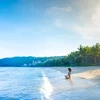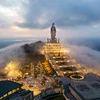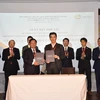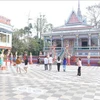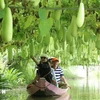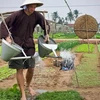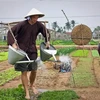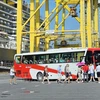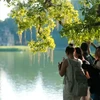Nui Chua National Park, in the central province of Ninh Thuan, is considered "a desert" thanks to its dry conditions and low rainfall.
Located around 40km from Phan Rang City , the 30,000ha site in Ninh Hai district was first designated a national park in 2003.
It is bounded by the East Sea to the south and east, by Highway 1 to the west and to the north by part of Cam Ranh Bay in neighbouring Khanh Hoa province.
The Nui Chua area consists of the southern end of the Truong Son Mountain Range of which the highest peak belongs to Co Tuy Mountain, situated at an altitude of 1,039m above sea level.
Located at the park's centre, the Chua Anh (elder brother God) and Chua Em (younger brother God) mountains, at over 1,000m in height, make for temperate conditions.
"It's ideal to visit the park during the dry season that extends from November to August," said park Director Huynh Vinh Kim.
"The harmonious combination of mountainous and marine landscapes, special geographical and weather features plus high biodiversity, makes the park a promising tourist attraction," Kim said.
Entering the park, tourists will encounter green trees growing amid stones and sand in an intensely hot and dry climate.
The park sports its own ochna tree forest that, rooted in the arid soil, resembles a collection of bonsai trees. During spring the trees blossom yellow to create a beautiful landscape. Typical ochna trees in the area belong to the hong mai family, which has red flowers, some of which have up to 13 petals.
Visitors are additionally afforded the chance to explore the park via 20km of asphalted roads embracing Mount Nui Chua, the Ngoan Muc Pass and Treo Lake on Mount Da Vach at an altitude of 250m.
Trekking the 10km road to a small lake, fed by an array of little streams, takes around four hours.
Lo O Stream in particular, is a historical beauty spot surrounded by cliffs and clear waterfalls, its flat granite stones idyllic for picnics.
The harsh climate combines both romantic lakes and effervescent waterfalls all year round. At a height of around 1,000m, 29,865ha of semi-tropical primeval forests on Chua Anh and Chua Em mountains are extremely bio-diverse thanks to an abundance of rainfall.
Flora in Nui Chua National Park includes 390 medicinal plants, over 100 varieties of bonsai as well as many edible varieties.
It also hosts 306 species of vertebrates, including the rare and precious black-shanked langur, the white-collared bear, and the jaguar.
The magnificent mountain ranges overlook the appealing and pristine bays of Vinh Hy and Ninh Chu Beach .
Guests interested in visiting the only savanna in Vietnam can drive from Ninh Chu Beach in Khanh Hai Commune along provincial Highway 702 to Vinh Hy Bay.
After a few hours of sightseeing, tourists are free to choose among beaches spread over nearly 40km for swimming, as well as coral reefs with diverse marine life, visible via glass bottomed tourist boats.
The farthest border of Nui Chua National Park is Thit Beach where sea turtles come and lay their eggs.
Trekkers can also walk down to Cau Gay Village , home to the Raglai ethnic minority group, and visit local craft shops to catch a glimpse into the lives of the artisans.
Military base CK 19, used by the liberation army in the, anti-American war, lies near Treo Lake on Mount Da Vach and includes traces of guerrillas trench shelters and the smokeless stoves.
The local coast was formerly used to transit weapon and other military equipment from north Vietnam to battlefields in the south./.
Located around 40km from Phan Rang City , the 30,000ha site in Ninh Hai district was first designated a national park in 2003.
It is bounded by the East Sea to the south and east, by Highway 1 to the west and to the north by part of Cam Ranh Bay in neighbouring Khanh Hoa province.
The Nui Chua area consists of the southern end of the Truong Son Mountain Range of which the highest peak belongs to Co Tuy Mountain, situated at an altitude of 1,039m above sea level.
Located at the park's centre, the Chua Anh (elder brother God) and Chua Em (younger brother God) mountains, at over 1,000m in height, make for temperate conditions.
"It's ideal to visit the park during the dry season that extends from November to August," said park Director Huynh Vinh Kim.
"The harmonious combination of mountainous and marine landscapes, special geographical and weather features plus high biodiversity, makes the park a promising tourist attraction," Kim said.
Entering the park, tourists will encounter green trees growing amid stones and sand in an intensely hot and dry climate.
The park sports its own ochna tree forest that, rooted in the arid soil, resembles a collection of bonsai trees. During spring the trees blossom yellow to create a beautiful landscape. Typical ochna trees in the area belong to the hong mai family, which has red flowers, some of which have up to 13 petals.
Visitors are additionally afforded the chance to explore the park via 20km of asphalted roads embracing Mount Nui Chua, the Ngoan Muc Pass and Treo Lake on Mount Da Vach at an altitude of 250m.
Trekking the 10km road to a small lake, fed by an array of little streams, takes around four hours.
Lo O Stream in particular, is a historical beauty spot surrounded by cliffs and clear waterfalls, its flat granite stones idyllic for picnics.
The harsh climate combines both romantic lakes and effervescent waterfalls all year round. At a height of around 1,000m, 29,865ha of semi-tropical primeval forests on Chua Anh and Chua Em mountains are extremely bio-diverse thanks to an abundance of rainfall.
Flora in Nui Chua National Park includes 390 medicinal plants, over 100 varieties of bonsai as well as many edible varieties.
It also hosts 306 species of vertebrates, including the rare and precious black-shanked langur, the white-collared bear, and the jaguar.
The magnificent mountain ranges overlook the appealing and pristine bays of Vinh Hy and Ninh Chu Beach .
Guests interested in visiting the only savanna in Vietnam can drive from Ninh Chu Beach in Khanh Hai Commune along provincial Highway 702 to Vinh Hy Bay.
After a few hours of sightseeing, tourists are free to choose among beaches spread over nearly 40km for swimming, as well as coral reefs with diverse marine life, visible via glass bottomed tourist boats.
The farthest border of Nui Chua National Park is Thit Beach where sea turtles come and lay their eggs.
Trekkers can also walk down to Cau Gay Village , home to the Raglai ethnic minority group, and visit local craft shops to catch a glimpse into the lives of the artisans.
Military base CK 19, used by the liberation army in the, anti-American war, lies near Treo Lake on Mount Da Vach and includes traces of guerrillas trench shelters and the smokeless stoves.
The local coast was formerly used to transit weapon and other military equipment from north Vietnam to battlefields in the south./.
